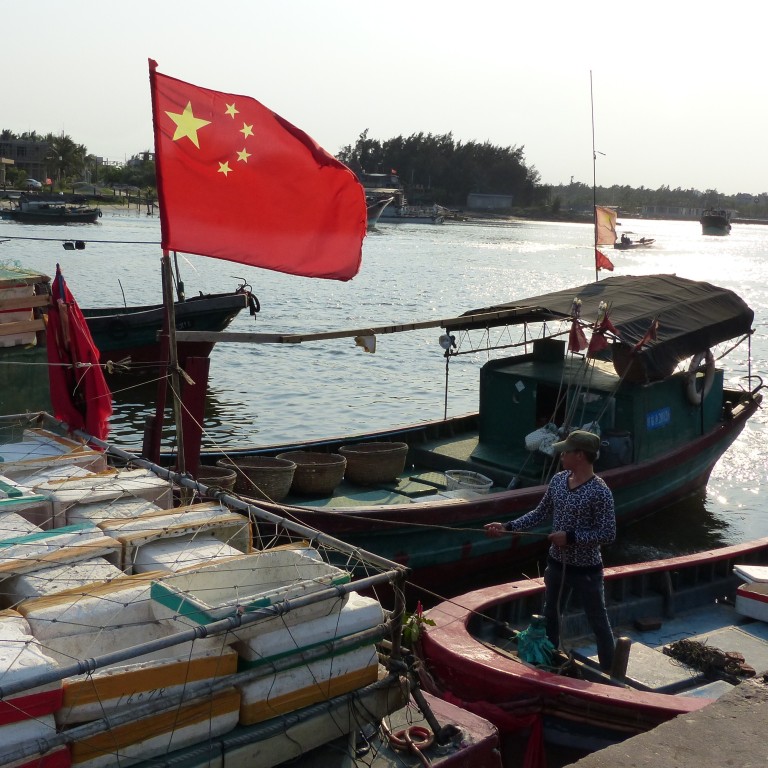
US Coast Guard report criticises China for illegal fishing and aggressive tactics
- Thousands of vessels ‘coerce and intimidate legitimate fishers in support of the Chinese Communist Party’s long-term maritime strategic goals’, report says
- American admiral emphasises role the US can play in helping other countries monitor Chinese fishing vessels in their waters
The US Coast Guard had harsh words for China in a new report on illegal fishing, calling for like-minded nations to unite against predatory states at sea in a thinly veiled warning to Beijing.
“The People’s Armed Forces Maritime Militia, estimated to include more than 3,000 vessels, actively carries out aggressive behavior on the high seas and in sovereign waters of other nations to coerce and intimidate legitimate fishers in support of the Chinese Communist Party’s long-term maritime strategic goals,” the report said.
Recently, the US Coast Guard has taken an increasingly assertive stance near China’s home turf, conducting its own exercises in the South China Sea and joining the US Navy in freedom of navigation operations across the Taiwan Strait.
Amid crumbling Washington-Beijing relations, the report signals the US Coast Guard’s resolve to increase operations against China’s sprawling distant water fishing fleet, which recent estimates place at around 17,000 vessels, with more than 12,000 of them operating in non-Chinese waters.
Although Chinese vessels are not the only ones illegally catching fish in other countries’ waters, a June report by the London-based Overseas Development Institute named China as the largest contributor to a “global fisheries crisis” because its distant water fishing fleet is the largest in the world.
In a 2019 index of illegal, unreported and unregulated (IUU) fishing developed by the Global Initiative Against Transnational Organised Crime, China was ranked the worst-scoring country.
Indonesia-Beijing dispute could lead to tough South China Sea code
“The US Coast Guard will shine a light on the activities of those who violate international rules-based order, exposing and holding accountable the most egregious predatory actors,” said the report.
In February, Admiral Karl Schultz, commandant of the US Coast Guard, said China was “one of the worst predatory fishing offenders” and a threat to the food security of other nations.
“This is a national security challenge warranting a clear response,” he said.
The report released on Thursday was couched in similar terms. Although no mention of China is included in the three “Lines of Effort” the report says the US Coast Guard will pursue, there is a clear emphasis on “predatory” behaviour, the kind Schultz said China was guilty of.

“Predatory and irresponsible nations that turn a blind eye to IUU fishing distort markets with aggressive economic policies, undermine free and open democracies, challenge security and prosperity, and destabilize at-risk nations around the globe,” the report said.
“Predatory nations seek to expand the reaches of their own state-driven economic models and grow their power at the expense of the sovereignty of others,” the report continued, making a veiled reference to the Chinese economy. “The US Coast Guard will confront the actions of predatory and irresponsible State actors by promoting partnerships with at risk coastal States and like-minded nations.”
On Thursday, Schultz appeared in a pre-recorded panel discussion hosted by the Centre for Strategic and International Studies in Washington, noting the role the US could play in helping other countries monitor Chinese fishing vessels operating in their waters. Schultz pointed to a case in July when a US Southern Command ship helped Ecuador locate a 300-ship Chinese fleet operating just outside of Ecuador’s waters.
Ecuador’s navy watching Chinese fishing fleet near Galapagos
However, the report did not explicitly rule out cooperation with China. In the foreword, Schultz praised the efforts of Operation North Pacific Guard, a six-nation enforcement effort, including China, that has combated IUU fishing in the North Pacific for the past 25 years.
“Our collective efforts have been overwhelmingly successful in nearly eliminating illegal high seas driftnet fishing in the North Pacific Ocean,” he said.
Beijing has recently taken measures to rein in Chinese fishing vessels operating in foreign waters.
In July, the Ministry of Agriculture and Rural Affairs banned Chinese vessels from fishing squid in certain parts of the Pacific and Atlantic to allow depleted populations time to recover. The three-month moratorium marked the first time China had issued a ban on its fishing fleets operating in international waters, according to the agricultural ministry.

